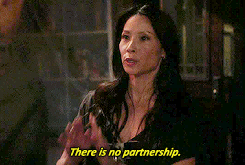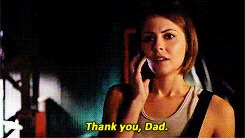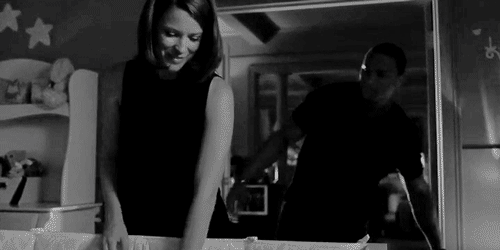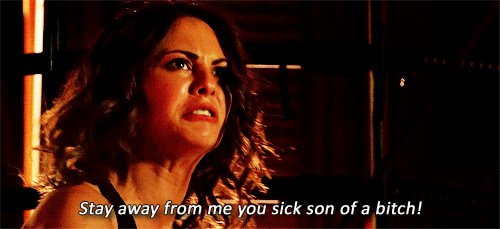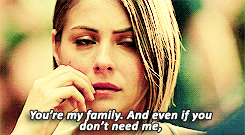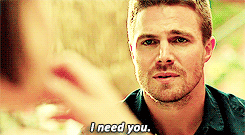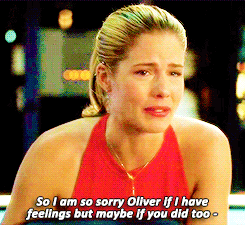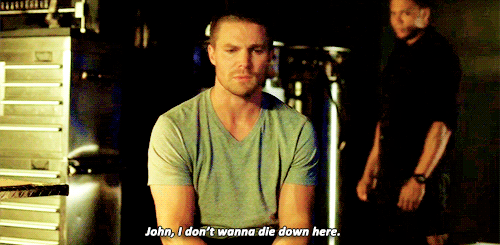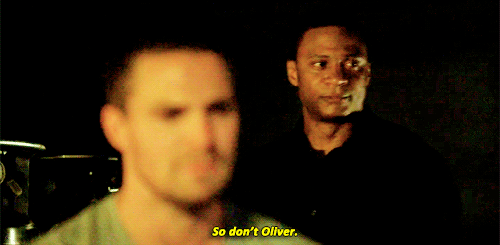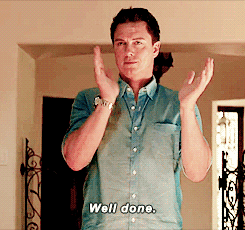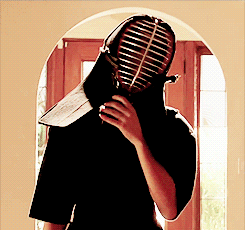
**This post contains spoilers for 3.01 of Arrow, “The Calm.”**
Last night, Arrow came back howling and screaming and… falling off of buildings shot with three arrows center-mass. But I’m not angry. Nope. Not at all. Ahem.
First of all, we should talk about the fact that Arrow now officially exists in an expanded universe, since The Flash premiered on Tuesday night. I’ll be covering The Flash later this week, because as a pilot it was solid, but for now, Arrow is largely unaffected by Flash canon except for the fact that Barry appeared in the premiere to ask for some advice from Oliver. The possibilities are endless and exciting but I can’t, with good conscience, say that the third season of Arrow got off to a stellar start. Any good vibes about crossovers, Easter eggs, and oblique references are a little marred by the death that occurred in the last minute of the premiere. But I’ll get to that in due time!
Season 3 opened with Team Arrow working like a well-oiled machine. Things are going so well that Diggle sums it up nicely: “There will only be two types of criminals in Starling City: the ones we put away, and the ones that are running scared.” They even have a new List, but it’s a super cool touchscreen with mugshots and X’s through captured criminals, because Felicity Smoak doesn’t do anything halfway. We also learn that Oliver’s been living in the foundry, because he’s really poor and I guess his life wasn’t depressing enough, but that’s okay because Felicity spruced it up with a fern! Oliver flirts that she should’ve bought him a bed too, which sounds like enough of an invitation to me, but Felicity just points out that he sleeps on the floor. At this point, Digg and Roy exchange an amazing “yeah we ship this” look in the background and for one moment, everything is perfect.


Digg says Lyla wants him to “build a bassinet from hell” so probably from Ikea, and that’s when Oliver gifts Digg with a beautiful arrowhead necklace. In theory, it’s lovely, because he made it himself and I may or may not pay upwards of $50 for the same one, but in practice, it’s probably not the smartest thing to put an arrowhead, a clear indicator of The Arrow, on Diggle’s baby girl. It’s kind of like a beacon.
Oliver then launches into this self-loathing recap of his disastrous love life, ranging from Laurel to Sara (and all of the McKennas and Helenas in between) and Diggle’s pretty much got hearts in his eyes when he says, “Maybe Felicity will change all that.”
Diggle: “And you love her. You told her yourself.”
Oliver: “I was trying to fool Slade.”
Diggle: “Yes. Except now, the only person you’re fooling is yourself.”
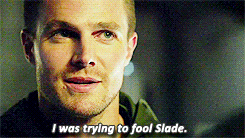
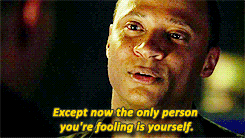
First of all, it’s fantastic that Diggle knows exactly what went down in that mansion. It’s even better that he knows the truth of how it went down. And best of all, it’s great that he can stand there and call Oliver on his denial and half-truths. Diggle is so great because anyone else would be worried about third-wheeling or being annoyed by lover’s spats, but this guy just wants his friends to be happy. We should all have a Diggle in our lives — or maybe we should all aspire to be the Diggle in our friend’s lives!

Later, after Felicity pep talks Oliver about speaking from the heart (accompanied by her actually patting his chest, can you blame her?) Oliver actually stops walking and asks her — with a stutter — if she wants to go to dinner. Her immediate reaction is amazing: “I’m being serious here, Oliver.” Hehe!
He talks in actual broken sentences, and she points it out to him, and then the most amazing thing happens: she falls silent and just watches him expectantly. I know! So great, right? So Oliver is forced to take a deep breath, and I assume he counts to three in his mind, then he asks her again. Her answer is an immediate yes and a radiant smile.
Oliver even flirts with her that night, asking if she likes Italian as he’s riding around pursuing bad guys and she’s working at Starling’s version of Best Buy. “And yes, I love Italian.” Unfortunately, Oliver is stuck with a tracking device when he encounters one of the baddies in the sewer, but he’s so excited for his date that he doesn’t notice. It turns out he was wearing his dinner suit under his Arrow suit, so when he stashes his Arrow garb in a secret hiding space, the tracker still points to his location.
The date goes even better than my wildest imagination — up to a point. They’re both nervous, but actually manage to cover a variety of relevant topics, including Oliver’s frequent shirtlessness and Felicity’s appreciation of said shirtlessness, before the appetizers arrive. Oliver decides it’s good first date protocol to talk about… his time in Hong Kong. In a way, I get it: he wants this date, this relationship, to mean something. These aren’t things he talked about with McKenna or Laurel, and to do it backwards — to talk about favorite movies and childhood best friends and sleep together and wake up the next morning only to have the Hong Kong conversation then, that’s not ever how it’s going to work between Oliver and Felicity. So while this might have brought the entire thing to an awkward and screeching halt, it makes sense that Oliver did it this way, especially given how it turns out for him.
“The entire time that I was gone, I could never completely trust someone. And when that goes on for so long, you stop seeing people for people. You see threats, or targets. And when I decided to come home, I just didn’t know how to turn that part of me off… but then I walked into your office. You were the first person that I could see as… a person. There was just something about you.”
“Yeah, I was chewing a pen.”
“It was red.”

Just as a monologue, this is beautiful. This show is based on a comic book, the style could’ve easily been campy with a lot of “bang!” and “pow!” speech bubbles, yet this show consistently goes for gritty and heartfelt… and this speech captures that spirit. What a pathos for Oliver Queen, what a way to recall that first batch of six or so episodes, what a way to showcase the unique way that he looks at Felicity as a person.
But there’s another element to this that’s almost tragic in nature, because Oliver came home to a family. Going by what he said about how difficult it was to turn off his survival instinct, that means he essentially came home to Threats and Targets. He saw Moira first, he hugged Thea, he embraced Tommy, he spoke to Laurel. He even built a shaky relationship with Diggle in those early episodes. But he didn’t see A Person until that third episode, almost halfway through, when he walked into that turquoise office and encountered the pink-shirted blonde girl chewing on a pen. Moira, Thea, and Tommy were Threats, but not to his livelihood or survival; they were Threats to his crusade. They were potential Targets for his enemies. Laurel was a Threat to his detachment, and as Slade even demonstrated only a couple of months ago, she was a constant Target for anyone wishing to hurt Oliver.
Oliver came home to a family, but what he got was a set of expectations that he had to work to destroy for the sake of the crusade. And isn’t that what we watched for that whole first season? He worked to keep all of his friends and family at a distance because that was the only way he knew how to function. Moira even told Oliver that she wished he hadn’t come home, Thea accused him of not even trying to be present, and he pretended to be drunk so that he didn’t have to run QC for his father. We didn’t see Oliver crack a real smile, or have a real reaction, until the IT girl unexpectedly babbled and counted down from three. He didn’t expect her to matter, because she was neither threat nor target; she was just someone he was supposed to encounter one time, for half an hour, before moving on with his life. But she cocked her head at his terrible “my coffee shop is in a bad neighborhood” excuse and then for a string of episodes, we watched him go back to her with increasingly ridiculous excuses.
Maybe it’s sad that Moira and Thea and Tommy weren’t People to Oliver when he came home, but I think it means something that Oliver chose to save Diggle’s life and ask him to join the team mere hours after he met Felicity Smoak. Something made him see Diggle as A Person instead of as a Threat. Of course he would remember that day in her office. Of course he would remember that red pen.
“Do you remember when I told you that because of what we do, I didn’t think that I could be with someone that I could really care about?”
“Yeah, I remember.”
“So maybe I was wrong.”
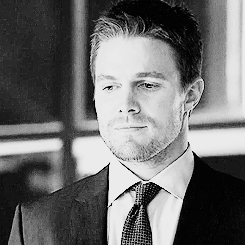

That bit is important because of just how many times Stephen Amell went back to that dialogue from 2.06. Almost every time he was challenged about his character’s feelings about Felicity, he would refer to that dialogue.
And then, because Oliver’s life is just tragedy-filled and awful, he hears a rocket and leaps just in time to grab Felicity and roll over her. He wakes up in smoke-filled rubble and scoops up an unconscious Felicity, who he carries all the way back to the foundry. Neither Digg nor Roy ask how the date went, so rude, but Roy does find the GPS tracker on Oliver’s stuff, which just sends Oliver on a spiral about distractions and not deserving nice things. He calls Lance and enlists his help, and then Felicity gasps awake. Good news, she ends up wound-free despite the blood and dirt all over her face.


Oliver ends up injected with Vertigo as he fights the new Count Vertigo (I guess it’s the crystal meth of Starling, it’s never going away) who keeps warping into versions of Oliver Queen. You’d think Oliver would’ve developed an immunity by now.
Meanwhile, Oliver wants QC back for some reason, and he’s dismayed to find himself facing off the punchable Ray Palmer, who parked his helicopter on the roof (I’m not kidding) and doesn’t get why that’s the douchiest thing any man has ever said on any TV show (excepting all of the things that came out of Chuck Bass’s mouth, of course). Palmer basically wants to rename the city to Star City, I guess? It makes Oliver give up on QC almost immediately, because wanting the company back is selfish and something the old Oliver would do. I don’t know which old Oliver he’s referring to… season 1 Oliver didn’t want the company, and season 2 Oliver is still this Oliver, right? Are we still hinging his identity on Tommy’s death, or is he a new Oliver since the Moira and Slade of it all?
His guilt spiral doesn’t stop at QC and Felicity, though; Oliver goes as far as kicking Diggle off the team, because of fatherhood. Felicity sobs in the foreground as Oliver basically says that his crusade means he gets to choose who is part of it.
“Detective Lance is laying in a hospital bed right now because I let him –”
“Wait wait, Lance is his own man who makes his own decisions, and so am I.”
“Not this one.”
“Oliver, I’ve given the past two years of my life to your crusade. I don’t know what that’s supposed to earn me, but it earns me at least the right to make my own choices.”
“No, it doesn’t.”
“Dammit, Oliver, you would be dead ten times over if it wasn’t for me!”
“You’re right, but this is my crusade, which makes this my decision.”
I love that Diggle is the first one to point out that Oliver doesn’t give the people in his life enough agency. That’s so perfect with my personal headcanon for Diggle — he’s so individualistic that he’s constantly having to remind Oliver that his team chooses to be there — that I kind of want to weep. He definitely Diggle’d this scene. I also love that Oliver’s guilt spiral extends to things that are out of his control, because that is so Oliver. And it’s not without reason — he has suffered a lot of loss, he’s just trying to circle the wagons, no matter how irrational it seems to everyone else. He encounters Sara during another mini-crusade, and she advises him, “We are not our masks.” It doesn’t seem to help, but it’s good nonetheless.
Diggle spends the episode being amazing. When he’s not dispensing amazing life advice to Oliver, he’s fretting over the basketball under Lyla’s hospital gown and enthusiastically saying “It’s a tank! Think a big, big tank!” to a bemused doctor. After his baby girl is born, Diggle admits that his whole world is changed. It’s true that children will make you reassess, but it doesn’t really teach Oliver to let people make their own choices. At least Diggle looks happy. (Note: the coloring on the gifs below is beautiful!)


In the maternity corridor, Oliver tells Felicity they need to talk, and for once in her life, she doesn’t want to, because “as soon as we talk, it’s over.”
“I’m so sorry. I thought that I could be me and the Arrow, but I can’t. Not now. Maybe not ever.”
“Then say ‘never.’ Stop dangling ‘maybes.’ Say ‘It’s never going to work out between us.’ Say you never loved me. Say –”
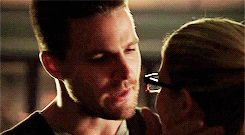

And then he whispers her name, grabs her face, and kisses her, but it’s the saddest and sweetest kiss I’ve ever had to watch. They even frame it so that there’s a beam of light between them when they break apart.

“Don’t ask me to say I don’t love you.”
“I told you as soon as we talked, it would be over.”
And then she walks away, and oh, I love it! It’s so sad but so great for Felicity because she can’t keep letting him call these shots! He did it in the mansion, and yeah, he never fell back on his “oh it was for Slade” excuse explicitly, but it was still there as an uncertainty. Now he knows how she feels. Now she knows how he feels. He kissed her, and she kissed him back, but she didn’t let him “maybe” her again — she took her dignity and she left him to figure out what he wants to do next, because she’s done playing the game.
I hope you’re as excited as I am about where they’ll go with this. It has the potential to be so, so unique.
He gets a call from Barry at that point, so he leaves to go appear on The Flash.
Oliver and Laurel have a really sweet scene that showcases how great their friendship could be if they’d stop trying to make fetch their romance happen. She’s practically vibrating with ill-concealed joy as she leads him to Captain Lance’s press conference, during which the Anti-Vigilante Task Force is officially disbanded. Laurel’s also thrilled to be working alongside Ollie in an official criminal ass-kicking partnership, and their shared smiles are really sweet!

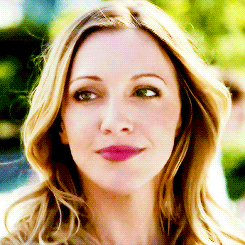
Captain Lance, who is still referred to as “Detective Lance” by Oliver, has left his beat cop days and his long hair in the past. He ends up in the hospital again after some sort of cardiac episode, which gets some deserved condemnation from Laurel, and he expresses a fear that he doesn’t really have an identity outside of being a cop. Spoiler alert: identity crises are gonna be a thing this season.
The Hong Kong flashbacks are unexpectedly hilarious. If you’re not laughing, as usual, at Oliver’s wig, perhaps you’re laughing at his ridiculous escape attempts? Or maybe you got a good guffaw out of his botched “Hi Mom, I’m alive, I’m in Hong Kong, how’s the weather?” email? A hearty chortle at his vow to Amanda Waller that he’ll never stop trying to escape? Not a lot happened, plot-wise, except to establish that’s he’s trapped in Hong Kong at Waller’s beck and call, so we have a lot of plotty stuff to look forward to for at least half a season.

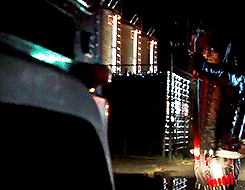
Roy was actually a cool cucumber and a good team player for the entire episode, which is encouraging given his Mirakuarc from last season. Presumably he’s paying penance for his drugged-up crimes, and he’s also distracting himself from losing Thea, but he could’ve just as easily gone off the rails after Thea’s rejection at the end of last season, so this is encouraging to see.
Less encouraging is Oliver’s attitude toward Roy. On the surface, it’s not that bad, since Roy clearly needs a mentor and Oliver needs a mentee. But after Oliver pushes Felicity away and practically cuts Diggle from the team, the fact that he takes Roy along with him to destroy a bomb makes it seems like he values Roy’s life far less than he does Diggle’s or Felicity’s. Even if that’s true on some level (after all, Roy is not an original team member, hasn’t been through their crucibles, and is still a bit of a loose cannon) it can’t feel great for Roy when he eventually realizes he’s the expendable one on the team.
At the end of the episode, Laurel meets Sara on a rooftop and they hug and joke about League of Assassin paid vacation days. Sara doesn’t say why she’s back, only that she doesn’t want to see Quentin, and she hints that things aren’t all rosy in the League right now. Laurel gets a summoning call from work, and Sara quotes Tommy Merlyn directly: “Laurel Lance, always trying to save the world.”
Laurel’s only gone for a minute before someone murmurs Sara’s name, and she spins around and appears to look between two people as she asks, “What are you doing here?” She doesn’t get an answer, she just gets three arrows to the stomach before she falls over backwards off the side of the building, her limp body landing hard in front of her horrified sister.

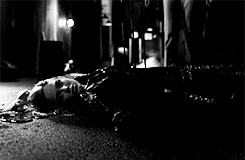
I can honestly say that the death of Sara Lance is the first time I’m truly questioning the writing and story direction on this show. I was ambivalent, and eventually doubtful, about Laurel’s arc in season 2, but ultimately I went along believing that the writers had a good plan for her. Even if that turned out not to be true, I still never really questioned the decisions. Some characters are just harder to write than others, and some decisions seem better at first than they do in hindsight. Sara was never one of those characters, so I’m a little upset at the timing of this in particular. Why have her survive that explosive season 2 finale only to have her die in this way?
Why did we have to kill Sara at all? Why does she have to die in order for Laurel to become the Black Canary? Why couldn’t she exist as a character who pops in occasionally to check on people? Why does it feel like this show kills more females than males? (And think about the fact that the females stay dead, but two of the males — Slade and Malcolm — have survived their “deaths.”)
I’ve made the mistake before of criticizing an episode that was ultimately part of a larger arc. Knowing that Caity Lotz is supposed to appear in multiple episodes this season would indicate that we are in for some flashbacks, possibly to explain what brought her back to Starling City and why she was targeted on that rooftop — and why the killer(s) waited until she was alone to take aim. So maybe, in context, this death will make sense, but as it stands alone, it feels like shock for shock’s sake. I’m waiting for good answers to my questions, but I’m worried that no answer will be good enough. I wanted more for Sara in her death, just like I wanted more for Shado in hers.

I think we can all agree that poor Laurel has been through a lot.
Next week: window crashing, graveside visits, some Sara flashbacks, and more of Ray Palmer’s amazingly punchable face.





